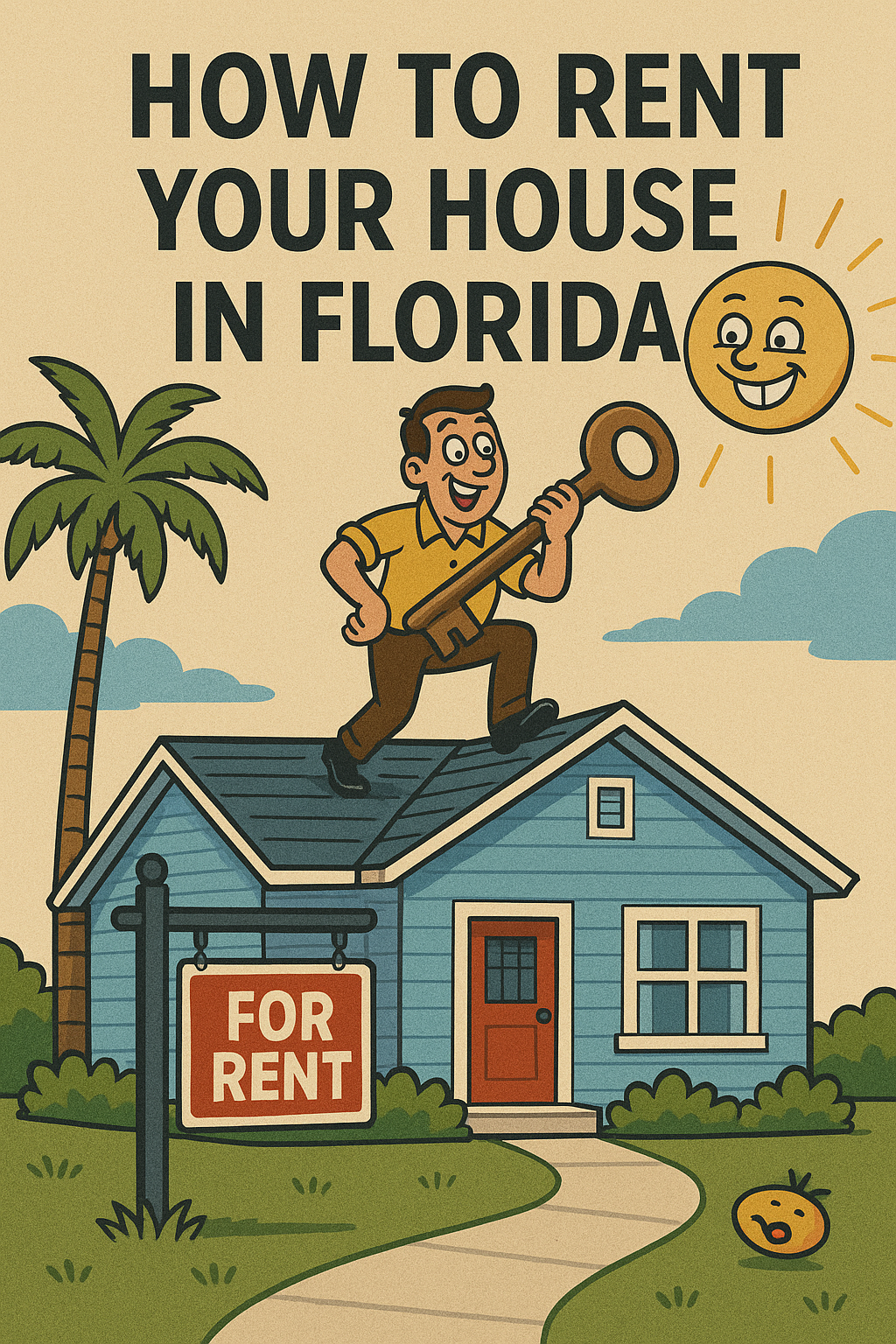
How to Rent Your House in Florida
By Jorge Vazquez, Graystone Investment Group
Before you throw your house up for rent, take a step back. I always tell new investors: don’t start with the property—start with the plan.
What’s the strategy that actually fits your finances?
-
Do you need quick cash flow? Maybe short-term or corporate rentals make sense.
-
Want steady income with less turnover? Long-term might be the play.
-
Want someone to eventually buy the place? Lease-to-own could be your lane.
-
Traveling a lot or out of state? Better plan for property management from day one.
I didn’t wake up with 40+ properties. I started with just one little rental. That first one taught me everything—the good, the bad, and the “why won’t the tenant stop calling me about the garbage disposal.” But the one thing that stuck? The strategy has to match your life.
So in this guide, I’ll walk you through how to rent your house in Florida the right way—based on real experience, not guesswork. We’ll talk prep, pricing, tenants, leases, and the biggest rookie mistakes I see every day.
Whether you’re renting your first home or looking to scale, this is where it starts. Let’s go.
Step 1: Choose Your Strategy
Renting a house sounds simple, but there are levels to this. And each strategy has different pros, cons, and cash flow expectations.
Here’s a breakdown:
1. Long-Term Rentals (12-month leases):
-
Pros: Stable income, fewer turnovers, easier to manage
-
Cons: Slower to build equity, rent caps in some areas, tenant wear and tear
2. Short-Term Rentals (Airbnb/VRBO):
-
Pros: High income potential, flexible usage
-
Cons: More management, city regs, hospitality-level expectations
3. Corporate or Mid-Term Rentals (30–90 day stays):
-
Pros: High-quality tenants (travel nurses, professionals), low vacancy
-
Cons: Furnishing costs, limited market demand in some areas
4. Lease-to-Own:
-
Pros: Tenant has skin in the game, future buyer locked in
-
Cons: Requires solid contracts and legal structure
Ask yourself: Do I want time freedom or max cash flow? Am I hands-on or hands-off? Do I need income now, or am I playing long-term equity?
Once you lock your strategy, the rest of this process gets easier.
Step 2: Know the Florida Laws
Florida is landlord-friendly—but that doesn’t mean it’s the Wild West. You still have to follow the rules.
-
Security deposits must be held in specific ways
-
You need to give 12-hour notice before entering the home
-
Lease terms and eviction procedures must follow Florida statutes
And if you’re renting short-term, you’ll need:
-
A local business tax receipt
-
A Florida Department of Revenue license
-
County-level tourist tax account
Don’t guess. If you’re unsure, hire a property manager or real estate attorney who lives in the details so you don’t have to.
Step 3: Prep the Property (Don’t Be Cheap)
This is where most people try to save a buck—and it costs them big.
No one’s renting your house for top dollar if it smells like mildew and the ceiling fan’s hanging on for dear life.
Do this instead:
-
Deep clean everything
-
Repaint with neutral colors
-
Fix broken cabinets, doors, knobs
-
Check appliances (they all need to work)
-
Mow the lawn, trim bushes, pressure wash the front
Florida renters especially care about:
-
A/C that works well
-
Pest control
-
Clean flooring (tile or LVP beats carpet every time)
This is a rental, not a rehab project. But you can’t treat it like a yard sale either. Presentable = profitable.
Step 4: Price It Right (Not Sentimentally)
Your home is special to you. To the market? It’s just a comp.
To price it properly:
-
Check rents on Zillow, Apartments.com, Rentometer
-
Look at similar bed/bath/sq ft within a 1-mile radius
-
Adjust for condition, upgrades, and amenities
-
Consider the time of year (rents are higher in summer in Florida)
But here’s the secret sauce: your house rents for what the market will pay today—nothing more.
Price it wrong and you’ll attract the wrong tenant or sit on vacancy. Either way, that’s lost money.
Step 5: Market Like You Mean It
Don’t list your rental like you’re selling a lawn mower. You need emotion and clarity.
Great listings include:
-
Clean, bright, wide-angle photos
-
A headline that sells: “Newly Renovated 3/2 in Tampa—Pet Friendly!”
-
Key details: sq ft, yard size, upgrades, nearby schools
-
What makes it special: “Walking distance to Riverwalk,” “Water included,” etc.
Post your listing everywhere:
-
Zillow
-
HotPads
-
Facebook Marketplace
-
Local groups and real estate investor circles
-
Realtor MLS if you’re using an agent
Pro tip: Add a video walkthrough. It filters out the lookie-loos and gives serious renters confidence.
Step 6: Screen Like a Detective (With a Smile)
A bad tenant will cost you 10x what you make in rent. Trust me—I’ve been there.
You need a real screening system:
-
Credit score check (600+ minimum for long-term)
-
Background check (no recent felonies)
-
Employment verification (ask for paystubs or W2s)
-
Landlord reference (Call. Don’t just read it.)
-
Income = 3x the rent minimum
Also—meet them. Zoom, phone, or in-person. You’ll learn more in 5 minutes of talking than in a 20-page app.
And yes, follow Fair Housing rules. No discrimination. Just qualification.
Step 7: Lock It In With a Solid Lease
Don’t grab a generic lease off Google. Florida has specific language and requirements.
If you’re managing yourself, get a proper Florida lease package from:
-
Florida Realtors
-
An attorney
-
A property management company
Include in your lease:
-
Rent amount, due date, late fee policy
-
Term length and renewal terms
-
What’s included (utilities, lawn, pest, etc.)
-
Pet rules, guest policy, smoking policy
-
Move-in condition and responsibilities
Before move-in, do a walkthrough with photos and a signed checklist. Protect yourself from the old “that was already like that” game.
Step 8: Collect Rent Like a Pro
Rent is not optional. Set the tone early.
Use online platforms:
-
Apartments.com (free and simple)
-
Buildium or RentRedi
-
Zelle or ACH (with receipts)
Late fees? Charge them. Don’t be a pushover.
Grace period? Set it. Stick to it.
Excuses? Life happens, but consistency wins.
This is a business—not a favor.
Step 9: Maintain Like It’s Your Investment (Because It Is)
Don’t disappear after move-in. Tenants want to feel heard—but they don’t want a landlord who micromanages.
Keep it simple:
-
Handle maintenance quickly
-
Do annual A/C service and pest control
-
Remind them 60 days before renewal
-
Raise rent responsibly, with value
And please—don’t get emotionally attached. If they scuff a wall, fix it. If they leave, fill it. Keep it moving.
Bonus: When to Hire a Property Manager
You might read all this and go, “Forget it—I’m calling someone.”
And that’s fair. A property manager can:
-
Market the home
-
Screen tenants
-
Collect rent
-
Handle repairs
-
File evictions if needed
At Graystone, we do all that and syndicate listings to our 30,000+ investor network. You invest, we do the rest.
If your time is more valuable than your stress threshold—delegate. That’s how real investors scale.
Final Thoughts
Renting your house in Florida can be a smart, scalable move. But don’t wing it. Don’t rush it. And for the love of equity—don’t forget your strategy.
If you’re just getting started, think like I did with property #1: learn the process, build the muscle, and keep it simple.
Keep it consistent, stay patient, stay true—if I did it, so can you.
Keep it consistent, stay patient, stay true—if I did it, so can you!
Ready to rent your house the smart way?
Contact Jay, our expert at 813-406-3846, or schedule directly at GraystoneIG.com/Jay
Let’s make that property cash-flow ready!
– Jorge Vazquez, CEO of Graystone Investment Group & Coach at Property Profit Academy
Pick your expert. Book your free 15-minute consult now. We are here to help!
Our Top Articles
Why You Should Sell Your Deals with Us
Let’s keep it real—wholesaling ain’t easy. You lock up a deal, hustle to find a [...]
Landlords, Listen Up: Florida’s A+ Economy Is Coming—Here’s Why 2025 Still Makes Sense
Florida’s A+ Economy in 2026: What This Means for Landlords, Renters, and Real Investors Like Me By Jorge Vazquez, [...]
What It Really Takes for Agents to Make Millions in Real Estate
What It Really Takes for Agents to Make Millions in Real Estate Inspired by a Fellow Featured Agent—Kat Palmiotti [...]
Property Profit Academy:
✔ Learn to buy properties with little to no money down.
✔ Build a $10M portfolio step by step.
✔ Master strategies like BRRRR and house hacking.








